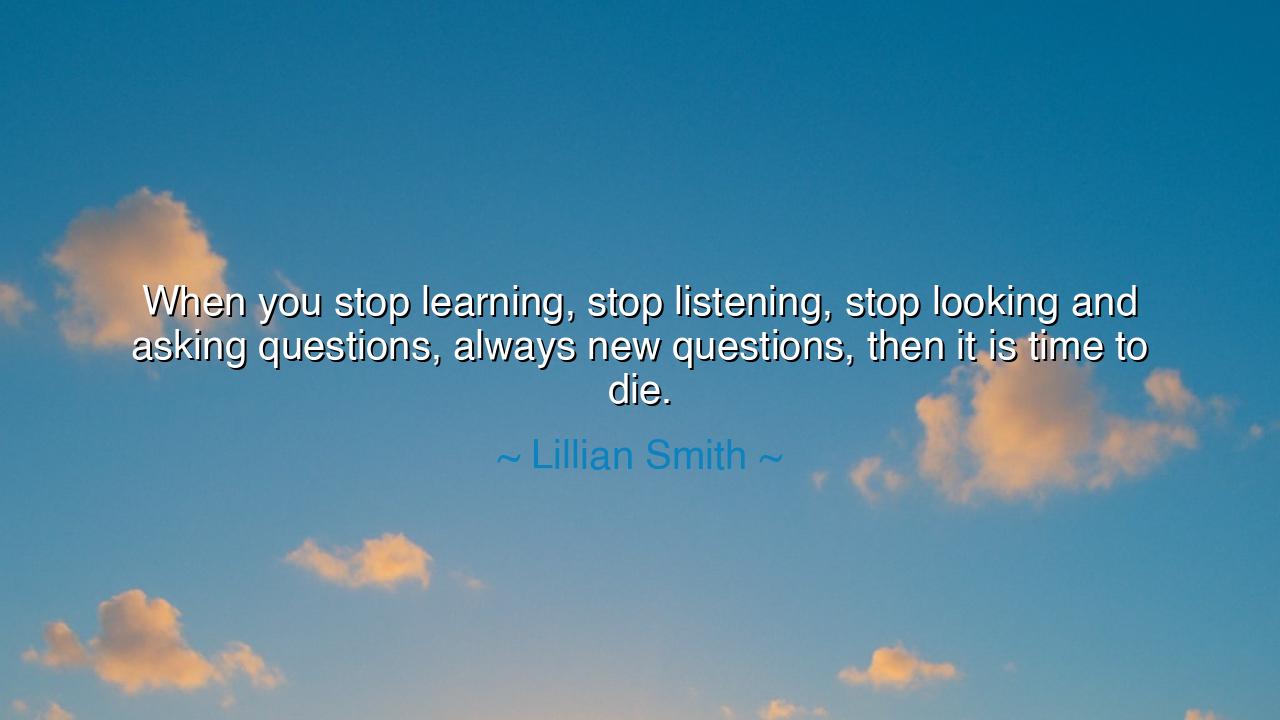
When you stop learning, stop listening, stop looking and asking
When you stop learning, stop listening, stop looking and asking questions, always new questions, then it is time to die.






In the stirring and luminous words of Lillian Smith, the Southern writer and moral visionary, we are called to awaken to the most sacred of human pursuits: “When you stop learning, stop listening, stop looking and asking questions, always new questions, then it is time to die.” These words, drawn from the heart of one who witnessed both ignorance and enlightenment in her lifetime, speak not merely of education, but of life itself as an unending act of discovery. For Smith reminds us that the moment we cease to wonder, we cease to live in the truest sense. The body may still draw breath, but the soul — that radiant spark of curiosity — begins to fade.
Learning, in her understanding, is not confined to the classroom nor the written word. It is the living pulse of existence, the sacred dance between the mind and the mystery of the world. The ancients would have recognized this truth. To the Greeks, philosophia — the love of wisdom — was not a discipline but a way of life. To stop learning was to turn away from the divine order of things. Lillian Smith, living in the tumultuous age of segregation and change, saw firsthand what happens when a people or a nation stops questioning — when minds grow complacent, and hearts grow cold. Her warning, therefore, is not gentle: to refuse to learn is a kind of death, a decay that begins in the spirit long before the body’s end.
She speaks also of listening, looking, and asking questions — the holy trinity of awareness. For to truly live is not only to think, but to perceive deeply, to remain open to the voices of others and the lessons hidden in every moment. Smith, who defied the racial and cultural boundaries of her time, learned by listening — to the pain of the oppressed, to the hypocrisies of power, to the still, small voice of conscience that urged her to speak truth even when it cost her comfort. Her words recall the wisdom of the ancients: that the unexamined life, as Socrates said, “is not worth living.” For to stop asking questions is to imprison the mind within its own certainties, and no prison is more tragic than the one built by one’s own fear of growth.
Consider the story of Galileo Galilei, the man who looked at the heavens and dared to question what others accepted as truth. He listened to the language of the stars and asked the forbidden question: What if the earth moves? For this act of learning — of refusing to stop looking, listening, and asking — he was condemned by his world. Yet centuries later, his courage became the foundation of modern science. Galileo’s defiance is the embodiment of Smith’s wisdom: that to keep learning is to stay alive, even when the world would rather you remain silent and blind.
But the death Smith warns of is not only societal — it is deeply personal. Many grow older and confuse age with wisdom, forgetting that wisdom is not what you have gathered, but what you continue to seek. When curiosity fades, when one stops being moved by beauty, by mystery, by the voice of another, one’s days lose their vitality. The ancient teachers knew that the wise man dies many times before his death, shedding ignorance as a serpent sheds its skin. Yet the foolish die but once, for they stopped learning long ago and mistook their slumber for peace.
Lillian Smith’s words therefore call us to courage — the courage to remain teachable, to admit what we do not know, to ask questions that unsettle both ourselves and others. Learning demands humility; it requires that we release pride and dwell in wonder. To keep learning is to honor the sacred rhythm of creation, for the universe itself is a teacher, endlessly unfolding before the eyes of those who dare to see.
So, my children of the questioning heart, take this wisdom into your days: never cease to learn, to listen, to look, to ask. Let curiosity be the pulse that keeps your spirit alive. Read, travel, converse with those who differ from you. When the world grows dim, ask it to reveal its light. When you are weary, listen to the voice of wonder that still whispers within you. For as Lillian Smith teaches, when the questions stop, life itself ends — but as long as you remain a seeker, you are immortal in spirit.
Thus, remember her eternal lesson: “When you stop learning… then it is time to die.” Let these words not sadden you, but awaken you. For life is not measured by years, but by curiosity — not by possessions, but by questions. Keep asking, keep listening, keep learning — and you will never truly die, for the mind that seeks truth and the heart that seeks understanding are as eternal as the stars.






AAdministratorAdministrator
Welcome, honored guests. Please leave a comment, we will respond soon